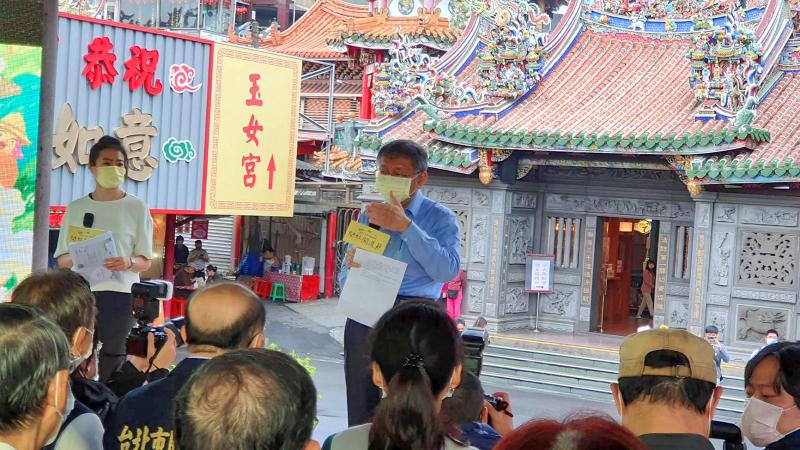Taipei is likely to set up a COVID-19 vaccination passport system that would result in people being seated in different areas in restaurants depending on vaccination status, Taipei Mayor Ko Wen-je (柯文哲) said yesterday.
Ko made the remark at a news conference to promote the Fun Guandu festival at Guandu Temple in the city’s Beitou District (北投).
During the event’s opening speech, Ko said he expects that more than 70 percent of Taipei residents would be fully vaccinated by the end of January and that Taiwan’s COVID-19 situation would ease fully before the Lunar New Year next year.

Photo: Yang Hsin-hui, Taipei Times
“Theoretically, people would not need to wear a mask after having received two doses,” he said, adding that with the expected progress in COVID-19 drug development, Taiwan could ease border restrictions in January.
“People who have not been vaccinated should go get their shots as soon as possible, because we will introduce a vaccination passport soon,” Ko said.
The passport would be integrated with the TaipeiPASS app, which would flash a “green light” for fully vaccinated people, “yellow” for those who had their first shot and “red” for unvaccinated people, he said.
Fully vaccinated people would be able to choose seats in restaurants freely, while unvaccinated people would be seated in separate areas with table dividers, Ko said.
More than 60 percent of Taipei residents have received at least one vaccine dose, he said.
As many people who are registered elsewhere live in the capital, it is possible that the actual first-dose coverage is about 70 percent, with 30 percent of people in Taipei being fully vaccinated, Ko said.
“As vaccine production has accelerated and Taipei can administer about 40,000 doses per day, I hope that the full-vaccination rate reaches about 70 percent by the end of the year,” he said.
Asked about Ko’s statement on mask wearing, Minister of Health and Welfare Chen Shih-chung (陳時中) said that the mask mandates would not be fully eased before the Lunar New Year.
Vaccinations would continue, said Chen, who heads the Central Epidemic Command Center (CECC).
Centers for Disease Control Deputy Director-General Chuang Jen-hsiang (莊人祥), who is a CECC spokesman, said that as long as there are COVID-19 outbreaks abroad, wearing a mask would be the “last line of defense” to prevent imported cases from spreading.

MAKING WAVES: China’s maritime militia could become a nontraditional threat in war, clogging up shipping lanes to prevent US or Japanese intervention, a report said About 1,900 Chinese ships flying flags of convenience and fishing vessels that participated in China’s military exercises around Taiwan last month and in January have been listed for monitoring, Coast Guard Administration (CGA) Deputy Director-General Hsieh Ching-chin (謝慶欽) said yesterday. Following amendments to the Commercial Port Act (商港法) and the Law of Ships (船舶法) last month, the CGA can designate possible berthing areas or deny ports of call for vessels suspected of loitering around areas where undersea cables can be accessed, Oceans Affairs Council Minister Kuan Bi-ling (管碧玲) said. The list of suspected ships, originally 300, had risen to about 1,900 as

Japan’s strategic alliance with the US would collapse if Tokyo were to turn away from a conflict in Taiwan, Japanese Prime Minister Sanae Takaichi said yesterday, but distanced herself from previous comments that suggested a possible military response in such an event. Takaichi expressed her latest views on a nationally broadcast TV program late on Monday, where an opposition party leader criticized her for igniting tensions with China with the earlier remarks. Ties between Japan and China have sunk to the worst level in years after Takaichi said in November that a hypothetical Chinese attack on Taiwan could bring about a Japanese

Right-wing political scientist Laura Fernandez on Sunday won Costa Rica’s presidential election by a landslide, after promising to crack down on rising violence linked to the cocaine trade. Fernandez’s nearest rival, economist Alvaro Ramos, conceded defeat as results showed the ruling party far exceeding the threshold of 40 percent needed to avoid a runoff. With 94 percent of polling stations counted, the political heir of outgoing Costa Rican President Rodrigo Chaves had captured 48.3 percent of the vote compared with Ramos’ 33.4 percent, the Supreme Electoral Tribunal said. As soon as the first results were announced, members of Fernandez’s Sovereign People’s Party

MORE RESPONSIBILITY: Draftees would be expected to fight alongside professional soldiers, likely requiring the transformation of some training brigades into combat units The armed forces are to start incorporating new conscripts into combined arms brigades this year to enhance combat readiness, the Executive Yuan’s latest policy report said. The new policy would affect Taiwanese men entering the military for their compulsory service, which was extended to one year under reforms by then-president Tsai Ing-wen (蔡英文) in 2022. The conscripts would be trained to operate machine guns, uncrewed aerial vehicles, anti-tank guided missile launchers and Stinger air defense systems, the report said, adding that the basic training would be lengthened to eight weeks. After basic training, conscripts would be sorted into infantry battalions that would take